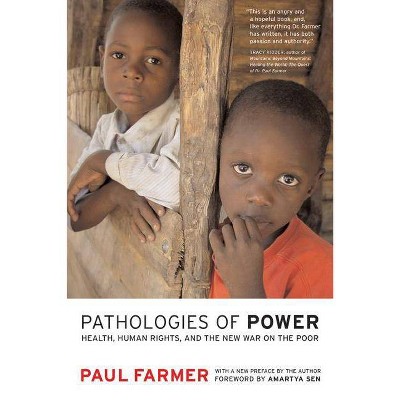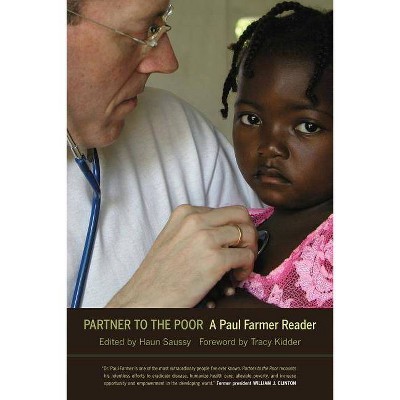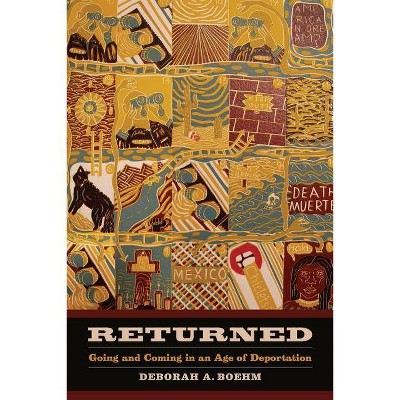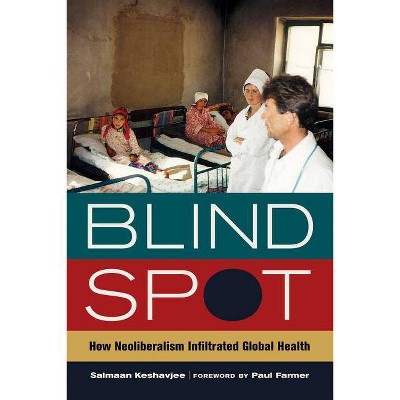Pathologies of Power - (California Public Anthropology) by Paul Farmer (Paperback)

Similar Products
Products of same category from the store
AllProduct info
<p/><br></br><p><b> About the Book </b></p></br></br>"Pathologies of Power" uses harrowing stories of life and death to argue thatthe promotion of social and economic rights of the poor is the most importanthuman rights struggle of our times.<p/><br></br><p><b> Book Synopsis </b></p></br></br><i>Pathologies of Power</i> uses harrowing stories of illness, of life--and death--in extreme situations to interrogate our understanding of human rights. Paul Farmer, a physician and anthropologist with twenty years of experience studying diseases in Haiti, Peru, and Russia, argues that promoting the social and economic rights of the world's poor is the most important human rights struggle of our times. A thoughtful memoir with passionate eyewitness accounts from the prisons of Russia and the beleaguered villages of Haiti and Chiapas, this book links the lived experiences of individual victims to a broader analysis of structural violence. Farmer challenges conventional thinking within human rights circles and exposes the relationships between political and economic injustice, on one hand, and the suffering and illness of the powerless, on the other. <p/> Farmer shows that the same social forces that give rise to epidemic diseases such as HIV and tuberculosis also sculpt risk for human rights violations. He illustrates the ways that racism and gender inequality in the United States are mirrored in pathology, plague, disease and death. Yet this doctor's autobiography is far from a hopeless inventory of human suffering. Farmer's disturbing examples are linked to a guarded optimism that new medical and social technologies will develop in tandem with a more informed sense of social justice. Otherwise, he concludes, we will be guilty of managing social inequality rather than addressing structural violence. Farmer's urgent plea to think about human rights in the context of global public health and to consider critical issues of quality and access for the world's poor should be of fundamental concern to pathologists, medical students, and humanitarians in a world characterized by the bizarre proximity of surfeit and suffering.<p/><br></br><p><b> From the Back Cover </b></p></br></br>This is an angry and a hopeful book, and, like everything Dr. Farmer has written, it has both passion and authority. <i>Pathologies of Power</i> is an eloquent plea for a working definition of human rights that would not neglect the most basic rights of all: food, shelter and health. This plea has special potency because it comes from Dr. Farmer, a person who has proven that the dream of universal and comprehensive human rights is possible, and who has brought food, shelter, health, and hope to some of the poorest people on this earth.--Tracy Kidder, author of <i>The Soul of a New Machine</i> and <i>Home Town</i><br /><br />Farmer's brilliance and charisma leap from the pages of his book. He challenges us to face the urgent theoretical and political challenges of the twenty-first century by linking structural violence to embodied social suffering and in the process calls for a new definition of human rights. Once this book is out, we will no longer be able to remain complacently--or rather, complicitly--on the sidelines.--Philippe Bourgois, author of <i>In Search of Respect: Selling Crack in El Barrio</i><br /><br />A passionate critique of conventional biomedical ethics by one of the world's leading physician-anthropologists and public intellectuals. Farmer's on-the-ground analysis of the relentless march of the AIDS epidemic and multi-drug resistant tuberculosis among the imprisoned and the sick-poor of the world illuminates the pathologies of a world economy that has lost its soul.--Nancy Scheper-Hughes, author of <i>Death without Weeping: the Violence of Everyday Life in Brazil</i><br /><br />In his compelling book, Farmer captures the central dilemma of our times--the increasing disparities of health and well-being within and among societies. While all member countries of the United Nations denounce the gross violations of human rights perpetrated by those who torture, murder, or imprison without due process, the insidious violations of human rights due to structural violence involving the denial of economic opportunity, decent housing, or access to health care and education are commonly ignored. <i>Pathologies of Power </i>makes a powerful case that our very humanity is threatened by our collective failure to end these abuses.--Robert S. Lawrence, President of Physicians for Human Rights and Edyth Schoenrich Professor of Preventive Medicine at the Bloomberg School of Public Health, Johns Hopkins University<br /><br />Farmer has given us that most rare of books: one that opens both our minds and hearts. It stands as a model of engaged scholarship and an urgent call for social scientists to forsake their cushy disregard for human rights at home and abroad.--Loïc Wacquant, author of <i>Prisons of Poverty</i><br /><br />Paul Farmer is an original: a powerful writer, an insightful theorist, and a human rights activist on behalf of the health needs of some of the poorest and most excluded people on the planet. <i>Pathologies of Power</i> brings together all his strengths, as a thinker and an activist. Every health worker, human rights teacher, and government official who seeks to improve the health status and life chances of their fellow human beings simply must read this book.--Michael Ignatieff, author of <i>Human Rights as Politics and Idolatry</i><br /><br />Paul Farmer is a great doctor with massive experience working against the hardest of diseases in the most adverse circumstances, and at the same time he is a proficient and insightful anthropologist. Farmer's knowledge of maladies such as AIDS and drug-resistant tuberculosis, which he fights on behalf of his indigent patients, is hard to match. But what is particularly relevant in appreciating the contribution of this powerful book is that Farmer is a visionary analyst who looks beyond the details of fragmentary explanations to seek an integrated understanding of a complex reality.--Amartya Sen, Nobel Laureate, Economics<p/><br></br><p><b> Review Quotes </b></p></br></br><br>"Do not read Paul Farmer's <i>Pathologies of Power</i>, now available in an updated paperback version, unless you want to be challenged. . . . It is a well-written medical anthropology [that] will challenge how you think about medical care."-- "Family Medicine"<br><br>"Farmer presents compelling evidence of how 'the most basic right -- the right to survive -- is trampled in an age of great affluence' . . ."-- "Psychiatric Services Journal"<br><br>"Farmer writes as a passionate advocate for global social justice. He makes a compelling case for the proposition that civil rights cannot be effectively defended if social and economic rights are not. As such, it is a significant contribution to the literature on public health. I would also recommend this book to physician readers in general, understanding that although they will find the case studies interesting, many may be annoyed by Farmer's political stance. Health and human rights advocates will find in it a rich vein of material to support their efforts."-- "Journal Of Nervous & Mental Disease"<br><br>"He challenges us to do better, and it would take a remarkably cynical or self-interested reader not to embrace his vision of human rights and social justice in which "public health and access to medical care are social and economic rights" on equal par with civil rights. Most important of all, he provides hope in the form of a very simple and easy to read moral compass, so that amidst the novel challenges and frustrations of health provision and analysis, one can begin to discern for herself a clear course of action."-- "Journal of Medical Humanities"<br><br>"In vivid case studies taken from both North and South, Farmer shares with us his experiences with the violation of human rights. The case studies may be depressing, but overall they convey a message of optimism."-- "Development Policy Review"<br><br>"It's crucial that we confront the link Farmer reveals between social inequality and disease."-- "Utne Reader"<br><br>"One of the world's leading physician-anthropologists presents a passionate argument against the inequalities of healthcare."-- "The Ecologist"<br><br>"Paul Farmer presents a disturbingly simple argument in this comprehensive and compelling analysis of the intersection between structural poverty and human health."-- "National Catholic Bioethics Quarterly"<br><br>"This emotional book is an appeal for a struggle for equity in the field of health and human rights."-- "British Medical Journal"<br><br>"This is neither a gloomy nor an overly accusatory book, but rather an optimistic one."-- "CHOICE"<br><br>"Thoughtful and provocative."-- "American Scientist"<br><br>"<i>Pathologies of Power </i>is a cry for those whose own shouts go unheard. It is a bitter dose of medicine doled out on behalf of the nameless, faceless millions who have no medicines of their own."-- "The Boston Globe"<br><br>"Farmer gives voice to the unheard poor around the world and challenges medical professionals to broaden the vision of medicine to include human rights."-- "The Lancet"<br><br>"Paul Farmer is a superb physician, a penetrating anthropologist, and a prophet of social justice. He combines an unflinching moral stance--that the poor deserve health care just as much as the rich do--with scientific expertise and boundless dedication. He has saved the lives of countless destitute patients in Haiti, Peru, and Russia, and he has shown that effective health services, even complex medical regimens, can be put in place in impoverished communities. . . . Farmer's moral philosophy, anthropological insights, and medical successes are described in his trenchant and timely new book, <i>Pathologies of Power</i>."-- "Natural History" (2/1/2004 12:00:00 AM)<br><br>"There are many kinds of gifted physicians: clinicians, researchers, and those who build institutions. Paul Farmer is the rarest of all: a prophet. . . . <i>Pathologies of Power</i> is a profound work; it deserves the widest possible audience."-- "New England Journal Of Medicine"<br><br>"This is Farmer's cri de coeur that those things not be forgotten in the quest for human rights."-- "The Globe And Mail" (1/1/2005 12:00:00 AM)<br><p/><br></br><p><b> About the Author </b></p></br></br><b>Paul Farmer</b> is Professor of Medical Anthropology at Harvard Medical School and Founding Director of Partners In Health. Among his books are <i>Infections and Inequalities: The Modern Plagues </i>(California, 1999), <i>The Uses of Haiti </i>(1994), and <i>AIDS and Accusation: Haiti and the Geography of Blame </i>(California, 1992). Farmer is the winner of a MacArthur Foundation genius award and the Margaret Mead Award for his contributions to public anthropology. He recently held the Blaise Pascal International Chair at the College de France. <b>Amartya Sen, </b> whose work challenges conventional market-driven economic paradigms, is the winner of the 1998 Nobel Prize in economics. He teaches at Trinity College, Cambridge University.
Price History
Cheapest price in the interval: 20.99 on October 22, 2021
Most expensive price in the interval: 20.99 on November 8, 2021
Price Archive shows prices from various stores, lets you see history and find the cheapest. There is no actual sale on the website. For all support, inquiry and suggestion messagescommunication@pricearchive.us




















